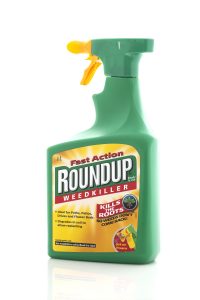Herbicides have become a way of life. For some, like farmers and ground maintenance men, herbicide application is part of making a living. For homeowners, herbicides are used to grow the perfect weed-free lawn. For all of us, herbicide usage is closely linked to the production of our food. The most common herbicide? Glyphosate-based herbicides. The most well-known brand? Roundup. The alarming part? Glyphosate exposure has been alleged to increase the risk of cancer. More particularly, glyphosate is allegedly related to the increased risk for non-Hodgkin’s lymphoma and other blood cancers. Glyphosate-based herbicides are still widely used in our country.
Glyphosate discovered in the 1970s
In 1970, a chemist working at Monsanto within the herbicide screening program named John Franz discovered glyphosate, an organophosphate compound which would become the active ingredient in Monsanto’s Roundup herbicide. By 1972, Roundup was marketed to the public as an environmentally friendly herbicide that is safe for both human and wildlife alike. Roundup was produced commercially starting in 1974. It would quickly become one of the most popular herbicides of all time.
By the 2000s, studies indicate increased cancer risk with glyphosate use.
By 2008, glyphosate is first identified as a potential risk factor for the development of non-Hodgkin lymphoma. In a May 2014 study, the chemical is determined by the International Agency for Research on Cancer to increase the risk of developing non-Hodgkin’s lymphoma. By March of 2015, that organization makes an official statement that glyphosate should be considered a “probable carcinogen.” What is it about glyphosate that makes it potentially harmful?
First, it is easy to become exposed to glyphosate, especially when it is the key ingredient in popular herbicides. Exposure can occur through skin contact, eye contact, or through inhalation whenever the product is sprayed. Second, studies suggest that once glyphosate enters the body, it poses a threat by acting as an antibiotic that is responsible for killing not only bad bacteria, but good bacteria as well. This poses a hazard by weakening the body’s immune system and damaging cellular DNA. Often, cellular damage occurs in the mouth and throat.
Non-Hodgkin’s lymphoma is a cancer that starts in the white blood cells and affects the body’s entire lymphatic system, the system responsible for protecting the body against disease and infections. This cancer can begin in any part of the body where lymphatic tissue is found, such as lymph nodes, the spleen, bone marrow, tonsils, and digestive tracts. Cancer that begins in the lymphatic system spreads really quickly and can easily spread throughout the rest of the body.
Jury awards groundskeeper Dewayne Johnson $289 million.
 In 2018, trial was held on behalf of Dewayne Johnson, one of the first persons to bring a lawsuit against Roundup for its alleged link to cancer. On August 10, 2018, a jury in California state court awarded a $289 million verdict to the 46-year-old former school groundskeeper who contracted terminal cancer after using Roundup to control weeds on the school grounds where he worked. Part of what made this trial significant was that scientific data from the World Health Organizations International Agency for Research on Cancer was presented to the jury to demonstrate the carcinogenic danger glyphosate has on humans. Litigation discovery also revealed internal emails among Monsanto executives in which the cancer risk had been brought to Monsanto’s attention.
In 2018, trial was held on behalf of Dewayne Johnson, one of the first persons to bring a lawsuit against Roundup for its alleged link to cancer. On August 10, 2018, a jury in California state court awarded a $289 million verdict to the 46-year-old former school groundskeeper who contracted terminal cancer after using Roundup to control weeds on the school grounds where he worked. Part of what made this trial significant was that scientific data from the World Health Organizations International Agency for Research on Cancer was presented to the jury to demonstrate the carcinogenic danger glyphosate has on humans. Litigation discovery also revealed internal emails among Monsanto executives in which the cancer risk had been brought to Monsanto’s attention.
Since the groundbreaking verdict in the Dewayne Johnson case, individuals potentially harmed by Monsanto’s glyphosate-based herbicide Roundup have been coming forward to be compensated for the health problems they are now forced to cope with. The legal battle against the Roundup manufacturer Monsanto, which has been recently acquired by Bayer, will continue in the new year. In October 2016, a multidistrict litigation panel had agreed that federal Roundup cancer cases should be consolidated and heard before Judge Vince Chhabria in the Northern District of California. The first glyphosate cancer case in federal court is scheduled to be held on February 25, 2019. Judge Chhabria has selected the case of Edwin Hardeman, out of over 620 pending cases, to be heard in front of a jury. Mr. Hardeman had been using Roundup on his property since 1980 and was diagnosed with large B-cell non-Hodgkins lymphoma in 2015. Undoubtedly, there will be many more federal cases to follow.
I am currently looking at new cases involving people potentially harmed by exposure to Roundup.
Note: Bayer and Monsanto continue to deny the connection between the use of Roundup and the increased risk of developing cancer. Photographs used in this post are for illustrative or editorial purposes only and are not intended for any commercial use.
 North Carolina Product Liability Lawyer Blog
North Carolina Product Liability Lawyer Blog


